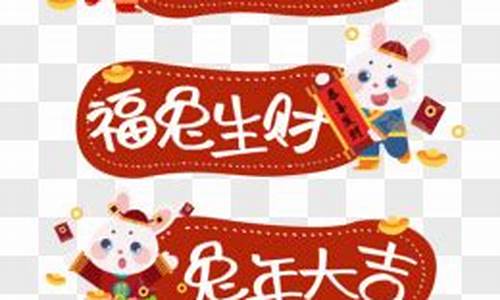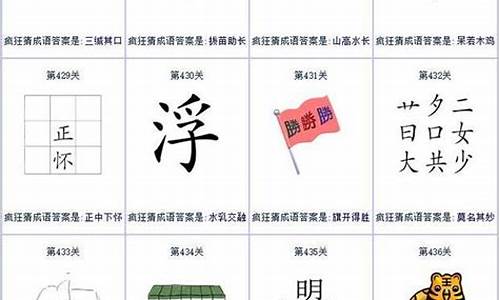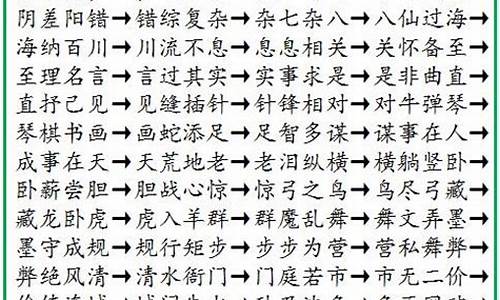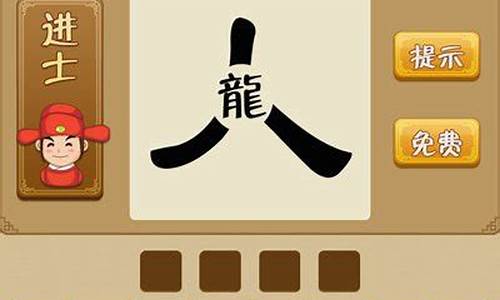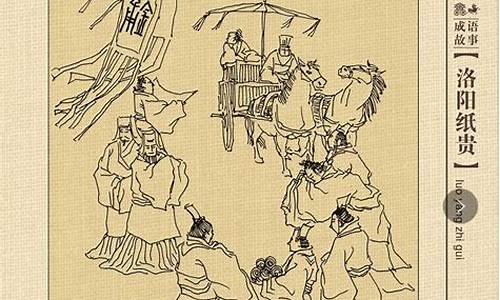您现在的位置是: 首页 > 成语典故 成语典故
十个简短的成语故事英语_十个简短的成语故事英语版
ysladmin 2024-08-07 人已围观
简介十个简短的成语故事英语_十个简短的成语故事英语版 现在,我将着重为大家解答有关十个简短的成语故事英语的问题,希望我的回答能够给大家带来一些启发。关于十个简短的成语故事英语的话题
现在,我将着重为大家解答有关十个简短的成语故事英语的问题,希望我的回答能够给大家带来一些启发。关于十个简短的成语故事英语的话题,我们开始讨论吧。
1.英语写成语故事
2.英语成语故事:黔驴技穷
3.少儿英语成语故事:毛遂自荐
4.英语成语故事 要短一点的 四年级水平 不许抄别人的 包括百度里的
5.英语的成语故事
6.英语成语故事 要有翻译
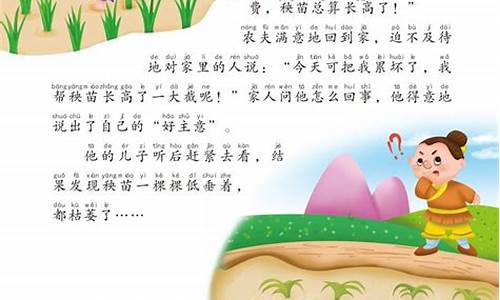
英语写成语故事
<<一叶障目>>有个书呆子从古书上读到“蝉翳叶”的故事,信以为真,就四处寻找,把蝉躲藏处的树叶全部摘下,拿回家遮脸作试验,问妻子能不能看见他。妻子气愤说看不见。他就拿这片树叶去街上行窃,被抓后说:“我一叶障目,你们能看见吗?” There is a nerd from the ancient books to read the story of the cicada shade lees,Believed to look far, the cicadas hiding in the lees all off,Cover the face as a take-home test, asked his wife can see him. Angry that his wife could not see. He took to the streets to steal this piece of leaf,After being arrested, said: I blinders, you can see it?
英语成语故事:黔驴技穷
守株待兔
春秋时代,宋国有个农夫,一天在耕田的时候,忽然跑来一只兔子,恰好碰在树桩上,脖子折断死了。农夫把兔子拾回家去,美美地吃了一顿兔肉。晚上他想:“我何必辛辛苦苦的种地呢?每天在树下能捡到一只兔子就够我吃的了。”于是他从此不再耕种,每天坐在树下等待兔子的到来。
这个成语,讥笑那些不想经过努力,存在侥幸心理,希望得到意外收获的人。
Sitting by a Stump, Waiting for a Careless Hare
In the Spring and Autumn Period, a former in the state of Song was one day working in the fields when he saw a rabbit bump into a tree stump accidentually and break its neck. The former took the rabbit home and cooked himself a delicious meal. That night he thought:"I neednt work so hard. All I he to do is wait for a rabbit each day by the stump." So from then on he ge up farming, and simply sat by the stump waiting for the rabbits to come and run into it.
This idiom satirizes those who just wait for a stroke of luck, rather than making efforts to oain what they need.
少儿英语成语故事:毛遂自荐
In ancient times there were no donkeys in Guizhou province. Somebody brought a donkey from somewhere and tied it to a tree at the foot of a mountain.
A tiger saw the donkey, and thought that it must be a fearsome(可怕的) monster. It hide behind a tree and spied on the donkey.
When the donkey brayed(叫) , the tiger was frightened, thinking that the donkey was about to devour(吞食,毁灭) it. After a while, seeing that the donkey had not moved, the tiger roached it and teased it. The donkey became angry, and kicked the tiger.
The tiger thought to itself: "Its then all it is capable of?" It then jumped on the donkey and ate it.
This idiom is used to mean that one has exhauseted one's skills.
过去贵州(黔)这个地方没有驴。有个多事的人用船运来了一头驴,运来后却没有什么用处,就把驴放到山脚下。
一只老虎看见了驴,以为这个躯体高大的家伙一定很神奇,就躲在树林里偷偷观察着,后来又悄悄走出来,小心翼翼地接近驴,不知道驴子的底细。
有一天,驴叫了一声,大虎大吃一惊,远远躲开,以为驴要咬自己了,非常恐惧。然而,老虎反复观察以后,觉得驴并没有什么特殊本领,而且越来越熟悉驴的叫声了。老虎开始走到驴的前后,转来转去,还不敢上去攻击驴。以后,老虎慢慢逼近驴,越来越放肆,或者碰它一下,或者靠它一下,不断冒犯它。驴非常恼怒,就用蹄子去踢老虎。
老虎心里盘算着:“你的本事也不过如此罢了!”非常高兴。于是老虎腾空扑去,大吼一声,咬断了驴的喉管,啃完了驴的肉,才离去了。
唉!那驴的躯体高大,好像有德行;声音洪亮,好像有本事。如不显出那有限的本事,老虎虽然凶猛,也会存有疑虑畏惧的心理,终究不敢攻击它。现在落得如此下场,不是很可悲吗?
英语成语故事 要短一点的 四年级水平 不许抄别人的 包括百度里的
volunteer to do sth/recommend oneself毛遂自荐
In the Warring States Period, the State of Qin besieged the capital of the State of Zhao.战国时代,秦国军队攻打赵国的都城。
Duke Pingyuan of Zhao planned to ask the ruler of the State of Chu personally for assistance.He wanted to select a capable man to go with him. 赵国的平原君打算亲自到楚国去请救兵,想挑选一个精明能干的人一同前去。
A man called Mao Sui volunteered. 有一个名叫毛遂的人,自告奋勇愿意同去。
When the negotiactions between the two states were stalled because the ruler of Chu hesitated to send troops, Mao Sui roached him, brandishing a sword. At that, the ruler of Chu agreed to help Zhao, against Qin.平原君到楚国后,与楚王谈了半天,没有一点结果。毛遂怒气冲冲地拿着宝剑,逼近楚王,终于迫使楚王答应出兵,与赵国联合共同抵抗秦国。
This idiom means to recommend oneself.“毛遂自荐”这个成语用来比喻自己推荐自己,不必别人介绍。
文化链接
英文中“毛遂自荐”可以说成“volunteer to do sth”,“volunteer”既可以作名词,也可以作动词,作名词时的意思是“志愿者”,作动词就可以解释为“志愿去做什么事”,就是“毛遂自荐”啦~
我们来一起看几个例句吧~
Our company volunteered to support and help the victims. 我们的公司毛遂自荐来帮助受灾灾民。
You can volunteer to work one or multiple shifts。你可以毛遂自荐做单班制,也可以选择多班制。
英语的成语故事
螳螂捕蝉,惊弓之鸟,毛遂自荐,东施效颦,亡羊补牢,掩耳盗铃,画蛇添足,后来居上,南辕北辙,唇亡齿寒,三顾茅庐,黔驴技穷,揠苗助长,滥竽充数,叶公好龙,画龙点睛,画蛇添足,买椟还珠,狐虎威,走马观花,过河拆桥,愚公移山,害群之马,负荆请罪画蛇添足 掩耳盗铃 亡羊补牢 买椟还珠 守株待兔
英语成语故事 要有翻译
画蛇添足
An official of the ancient State of Chu awarded a pot of wine to his men after the ceremony of Spring Sacrifice. One man said, “We he only one pot of wine. It's not enough for all of us but sufficient for one. Let's determine who'll he the wine by drawing a snake on the ground. He who finishes first will he the wine.”
The others agreed. Very soon, one man finished his snake. He was about to drink the wine when he saw the others were still busy drawing. He said complacently,“How slowly you are! I still he enough time to add feet to my snke.” But before he finished the feet, another man finished his snke and grabbed the pot from him, saying,“Whoever has seen a snake with feet? Yours is not a snke. So the wine should be mine!” He drank the wine. The man adding the feet to the snake had to give in and could only regret his foolishness.
楚国有一个官员,在春天祭过了祖宗之后,便将一壶酒赏给他的办事人员喝。有人提议:“我们只有一壶酒,肯定不够我们大家喝的,一个人喝倒是绰绰有余。我们每人在地上画一条蛇,谁画得最快,就把这壶酒给他。” 大家都同意了。
有一个人很快就把蛇画好了。他正打算喝这壶酒时,看见别人都还忙着画呢。他就得意扬扬地说:“你们画得好慢呀,等我再画上几只脚吧!” 他的蛇脚还没画完,另一个人已经把蛇画好了。那人把酒壶夺了过去说:“有谁见过长脚的蛇?你画的不是蛇,这壶酒应该是我的了。”说罢,就喝起酒来。那个给蛇画脚的人没办法,只能懊悔自己的愚蠢。
一鸣惊人
In the Warring States Period, Duke Wei of Qi neglected state affairs, for the first three years of his reign, giving himself over to dissipation. One of his ministers, Chun Yukun who had a good sense of humour, said to him: 'There is a big bird which has neither taken wing nor sung for three years.' The duke answered, 'Once that bird starts to fly and sing, it will astonish the world.' The duke thereupon devoted himself to his duties and built his state up into a powerful one.
战国时代,齐威王即位后做了三年国君,只顾享乐,不理政事。有个善于说笑话的人叫淳于髡,一天对齐威王说:“城里有一只大鸟,三年不飞也不叫,你知道这是什么道理?”齐威王说:“这鸟不飞则罢,一飞就冲天;不鸣则罢,一鸣就惊人。”在淳于髡的激发下,齐威王开始治理国家,取得很大成绩,齐国的声威一直保持了几十年。
杞人忧天
In the Spring and Autumn Period, in the State of Qi there was a man who always let his imagination run away with him. One day he even worried that the sky would fall on his head. He was so worried that he could neither eat nor sleep. Later, someone persuaded him that his fears were Ground-less.
春秋时代,杞国有一个喜欢胡思乱想的人。一天,他竟然想到,天会塌下来,地会陷下去,自己到哪里去安身?这个人越想越害怕,整天愁眉苦脸,坐立不安,白天吃不下饭,晚上睡不着觉。后来有人耐心地开到他,他才放下了心。
精卫填海
Once upon a time, the youngest daughter of Emperor Yan, legendary ruler of primitive China, went boating on the Eastern Sea. While she was enjoying herself, a strong wind rose on the sea and her boat capsized. Just before she was buried by the surging wes, her spirit turned into a beautiful bird. As it flew over the roaring sea, it cried sadly in the sound "jinwei, jingwei". That was why people called it "Jingwei".
The bird lived on a mountain near the sea. It hated the sea so much that it decided to fill it up. Every day, it flew to and fro between the mountain and the sea, carrying in a twig or a pebble from the mountain and dropping it into the sea.
One day, the roaring sea said to Jingwei, "Poor little bird, stop doing that meaningless thing! You'll never fill me up." Jingwei replied, "I'll fill you up no dou! I will, even if it'll take me thousands of years! I'll fight on until doomsday!"
The bre little bird kept carrying twigs and pebbles from the mountain to the Eastern Sea without taking a rest.
From this fable comes the idiom "The bird Jingwei trying to fill the sea". We use it to describe people who are firm and indomitable and will not stop until they reach their goal.
从前,炎帝(传说中中国原始社会的统治者)的小女儿在东海上划船。正当她划得高兴时,海面上突然升起一阵大风,把她的小船弄翻了。就在她要被汹涌的波浪吞 没时,她的灵魂变成了一只美丽的小鸟。它飞过那咆哮的海面,伤心的叫着"精卫,精卫"的声音。所以人们就叫她"精卫"。
精卫鸟住在靠海的一座山上。它非常恨大海,所以决心要把它填平。它每天来回于山海之间,把从山上衔来的小树枝和小石子扔在大海里。
一天,咆哮的大海对精卫说:"可怜的小鸟,停止你那无谓的举动吧!你是永远都填不平我的。" 精卫回答说:"我当然会把你填平的!即使这需要千千万万年的时间,我也一定会斗争到底,直到你的末日来临!"
这只勇敢的小鸟继续从山上衔来小树枝和小石子,扔到东海中,从未有片刻休息。
"精卫填海"这个成语就是由这个传说而来的,形容那些坚定不移,不屈不挠,不到目的决不罢休的人。
Sweat is HuoGuang, emperor han commander-in-chief of TuoGu ministers, drinking eight years of emperor han style-came kisen, ruling pomp very hey. HuoGuang nearby he a call YangChang people, act is timid, popular with HuoGuang recognition, rose to prime minister position, seal for anping syndrome. Actually, YangChang humanness cowardly incompetence, timid, not when the prime minister of the material. 74 B.C., was only twenty one-year-old han emperor died.both in WeiYangGong kisen, with all the princes HuoGuang counsel, chose the emperor's grandson made WangLiuHe nearbu heir. Behold LiuHe ascended the mid-north song and dance, often pleasure-resorts. HuoGuang heard later, anxieties, and bike ride general ZhangAn births, TianYanNian secret counsel, on to nullify LiuHe, set up other Yin jun. After TianYanNian HuoGuangPa goading agreed to jointly YangChang, tell gun. YangChang all of a sudden, she was scared to sweat, panic, just something indistinctly fence. YangChang wife, is TaiShiGong sima qian's daughter, quite he the guts. She saw her husband shilly-shally earance, secretly worried, while TianYanNian change clothes walk away, infero-anterior advised her husband and said, "National affairs, will shilly-shally. General has ChengYi, you should also chosin reservoir, otherwise inevitable difficult ahead." YangChang step back and forth in the house, but had no acid attention. Just at this time TianYanNian back, SiMaFu people oid inferior, straight-tempered without embarrassment and TianYanNian meet, told TianYanNian, her husband willing to listen to the general's command. TianYanNian after listening pleased to take lee walk. TianYanNian returns HuoGuang, HuoGuang very satisfied. YangChang brought all the princes immediately arrange table, playing please dowager. The next day, YangChang advice, ernie see luang nearbu king unbearable successin statement of reason. Queen letter removed immediately LiuHe, another sign of emperor of the once SunLiu enquiry for jun, was said han XuanDi.
Idioms citations, han shu YangChang biography of our afraid, not words. Jia sweated back ACTS yes just.
Idioms interpretations ", "Jia drenched, sweating much soaked backbone. Describe sweat. Also describe extreme fear or ashamed excessive.
汗流浃背 汉大将军霍光,是汉武帝的托孤重臣,辅佐八岁即位的汉昭帝执政,威势很重。霍光身边有个叫杨敞的人,行事谨小慎微,颇受霍光赏识,升至丞相职位,封为安平候。其实,杨敞为人懦弱无能,胆小怕事,根本不是当丞相的材料。公元前74年,年仅廿一岁的汉昭帝驾崩于未央宫,霍光与众臣商议,选了汉武帝的孙子昌邑王刘贺作继承人。谁知刘贺继位后,经常宴饮歌舞,寻欢作乐。霍光听说后,忧心忡忡,与车骑将军张安世、大司马田延年秘密商议,打算废掉刘贺,另立贤君。计议商定后,霍光派田延年告诉杨敞、以便共同行事。杨敞一听,顿时吓得汗流浃背,惊恐万分,只是含含糊糊,不置可否。杨敞的妻子,是太史公司马迁的女儿,颇有胆识。她见丈夫犹豫不决的样子,暗暗着急,趁田延年更衣走开时,上前劝丈夫说;“国家大事,岂能犹豫不决。大将军已有成议,你也应当速战速决,否则必然太难临头。”杨敞在房里来回酸步,却拿不定注意。正巧此时田延年回来,司马夫人回避不及,索性大大方方地与田延年相见,告知田延年,她丈夫愿意听从大将军的吩咐。田延年听了后高兴地告辞走了。田延年回报霍光,霍光十分满意,马上安排杨敞领众臣上表,奏请皇太后。第二天,杨敞与群臣遏见皇太后,陈述昌邑王不堪继承王位的原因。太后立即下诏废去刘贺,另立汉武帝的曾孙刘询为君,史称汉宣帝。
成语出处《汉书·杨敞传》敝惊惧,不知所言。汗出浃背徒唯唯而已。
成语释义“浃”,湿透,出汗多,湿透脊梁。形容满身大汗。也形容极度惶恐或惭愧过度。
好了,今天关于“十个简短的成语故事英语”的话题就讲到这里了。希望大家能够通过我的讲解对“十个简短的成语故事英语”有更全面、深入的了解,并且能够在今后的学习中更好地运用所学知识。

